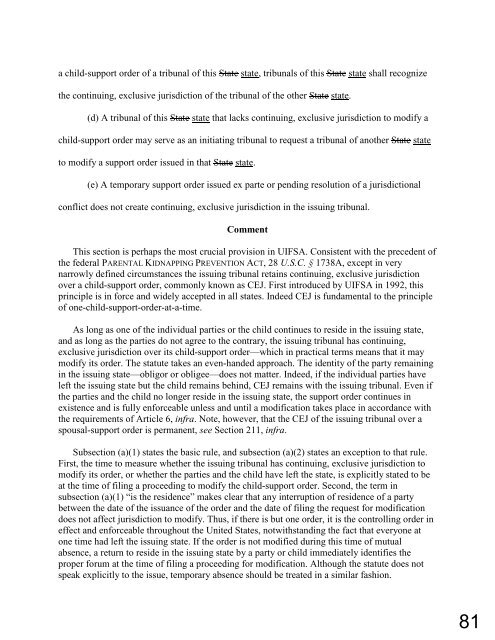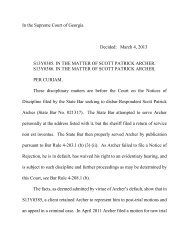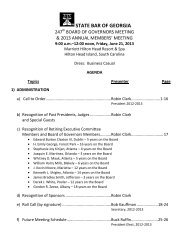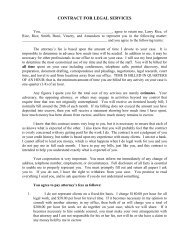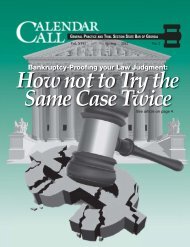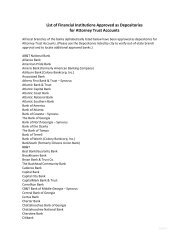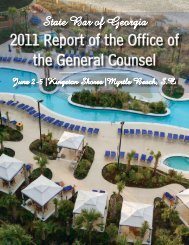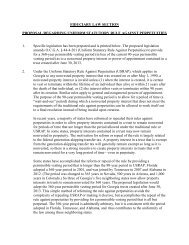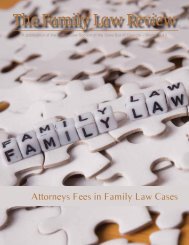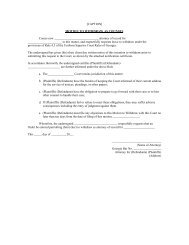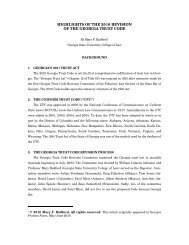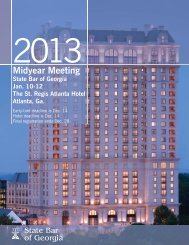2008 Amendments to the Uniform Interstate Family Support Act ...
2008 Amendments to the Uniform Interstate Family Support Act ...
2008 Amendments to the Uniform Interstate Family Support Act ...
You also want an ePaper? Increase the reach of your titles
YUMPU automatically turns print PDFs into web optimized ePapers that Google loves.
a child-support order of a tribunal of this State state, tribunals of this State state shall recognize<br />
<strong>the</strong> continuing, exclusive jurisdiction of <strong>the</strong> tribunal of <strong>the</strong> o<strong>the</strong>r State state.<br />
(d) A tribunal of this State state that lacks continuing, exclusive jurisdiction <strong>to</strong> modify a<br />
child-support order may serve as an initiating tribunal <strong>to</strong> request a tribunal of ano<strong>the</strong>r State state<br />
<strong>to</strong> modify a support order issued in that State state.<br />
(e) A temporary support order issued ex parte or pending resolution of a jurisdictional<br />
conflict does not create continuing, exclusive jurisdiction in <strong>the</strong> issuing tribunal.<br />
Comment<br />
This section is perhaps <strong>the</strong> most crucial provision in UIFSA. Consistent with <strong>the</strong> precedent of<br />
<strong>the</strong> federal PARENTAL KIDNAPPING PREVENTION ACT, 28 U.S.C. § 1738A, except in very<br />
narrowly defined circumstances <strong>the</strong> issuing tribunal retains continuing, exclusive jurisdiction<br />
over a child-support order, commonly known as CEJ. First introduced by UIFSA in 1992, this<br />
principle is in force and widely accepted in all states. Indeed CEJ is fundamental <strong>to</strong> <strong>the</strong> principle<br />
of one-child-support-order-at-a-time.<br />
As long as one of <strong>the</strong> individual parties or <strong>the</strong> child continues <strong>to</strong> reside in <strong>the</strong> issuing state,<br />
and as long as <strong>the</strong> parties do not agree <strong>to</strong> <strong>the</strong> contrary, <strong>the</strong> issuing tribunal has continuing,<br />
exclusive jurisdiction over its child-support order—which in practical terms means that it may<br />
modify its order. The statute takes an even-handed approach. The identity of <strong>the</strong> party remaining<br />
in <strong>the</strong> issuing state—obligor or obligee—does not matter. Indeed, if <strong>the</strong> individual parties have<br />
left <strong>the</strong> issuing state but <strong>the</strong> child remains behind, CEJ remains with <strong>the</strong> issuing tribunal. Even if<br />
<strong>the</strong> parties and <strong>the</strong> child no longer reside in <strong>the</strong> issuing state, <strong>the</strong> support order continues in<br />
existence and is fully enforceable unless and until a modification takes place in accordance with<br />
<strong>the</strong> requirements of Article 6, infra. Note, however, that <strong>the</strong> CEJ of <strong>the</strong> issuing tribunal over a<br />
spousal-support order is permanent, see Section 211, infra.<br />
Subsection (a)(1) states <strong>the</strong> basic rule, and subsection (a)(2) states an exception <strong>to</strong> that rule.<br />
First, <strong>the</strong> time <strong>to</strong> measure whe<strong>the</strong>r <strong>the</strong> issuing tribunal has continuing, exclusive jurisdiction <strong>to</strong><br />
modify its order, or whe<strong>the</strong>r <strong>the</strong> parties and <strong>the</strong> child have left <strong>the</strong> state, is explicitly stated <strong>to</strong> be<br />
at <strong>the</strong> time of filing a proceeding <strong>to</strong> modify <strong>the</strong> child-support order. Second, <strong>the</strong> term in<br />
subsection (a)(1) “is <strong>the</strong> residence” makes clear that any interruption of residence of a party<br />
between <strong>the</strong> date of <strong>the</strong> issuance of <strong>the</strong> order and <strong>the</strong> date of filing <strong>the</strong> request for modification<br />
does not affect jurisdiction <strong>to</strong> modify. Thus, if <strong>the</strong>re is but one order, it is <strong>the</strong> controlling order in<br />
effect and enforceable throughout <strong>the</strong> United States, notwithstanding <strong>the</strong> fact that everyone at<br />
one time had left <strong>the</strong> issuing state. If <strong>the</strong> order is not modified during this time of mutual<br />
absence, a return <strong>to</strong> reside in <strong>the</strong> issuing state by a party or child immediately identifies <strong>the</strong><br />
proper forum at <strong>the</strong> time of filing a proceeding for modification. Although <strong>the</strong> statute does not<br />
speak explicitly <strong>to</strong> <strong>the</strong> issue, temporary absence should be treated in a similar fashion.<br />
81


